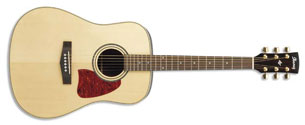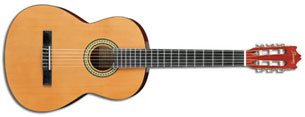A bit of advice for people taking up the guitar
|
Buying
your first guitar |
|
Where to buy
|
If
you are about to buy your first guitar or are buying one
for your child, you don't want to spend a fortune until
you know that you or your child are going to stick with
it. That said you also don't want to buy a nasty cheap guitar
that either doesn't stay in tune or when in tune at the
open strings, is out of tune by the time you go five or
six frets up the neck.
My personal opinion is not to buy a cheap guitar package
from someone like Argos. The first reason is because a lot
of the cheap guitars that you get aren't very good. I'm
not saying that all the guitars that shops like Argos sell
are rubbish because some are undoubtedly very good value
for money. The trouble is that you don't get to test the
guitar before you buy it. Even if you did you probably wouldn't
be able to tell if it was any good. Secondly you can't get
any help or advice about the guitars from a member of staff.
I would also avoid buying your guitar online for the same
reasons as above i.e. You can't talk to anyone or test the
guitar. If you do buy it online I advice using a well known
service or from a website with a store you can visit if
you have problems! A friend of mine bought an effects board
online and had problems with it. He then found out that
it was a faceless company probably run from a warehouse
in Europe somewhere and there was no one to talk with to
resolve the problem.
I would personally go to a reputable music shop where there
are people who know about the guitars they are selling.
In a good music shop they will give you advice for free
and let you test the guitars before buying them. If later
you have a problem with the guitar, it needs setting up
or new strings fitted, you have a shop to go back to. I
personally think this is worth paying a little more for!
|
|
A few bits of information on guitars
|
| The
guitar that's best for you depends on the type of music
you want to play. Below are pictured some of the most
common types of guitar. |
Acoustic guitars
Acoustic guitars give a reasonable amount
of volume and normally only need amplifying when gigging
|
 |
On
the left is an Acoustic guitar |
This
type of guitar is a key component in Folk Music but
can also be used in most other styles. The guitar has
a hollow body to allow the sound to resonate and some
Acoustic guitars have a cutaway where the body and neck
meet to give easier access to the higher frets. They
only have metal strings. Some models have electronic
pickups, EQ and volume controls, and a socket to plug
straight into an amplifier. These are usually referred
to as Electro Acoustic guitars.
|
 |
On
the left is a Classical guitar |
| They
can also be called Spanish guitars and this type of guitar
is sometimes used in Pop, Rock and other styles but is
mainly used in Flamenco and Classical music. It is probably
best to only get this type of guitar if you are looking
to specifically learn either of these two styles. They
usually have the three lowest strings made of metal and
the rest are made of nylon. |
Electric guitars
Electric guitars are not very loud on
their own and will require a guitar amplifier to be
played properly
|
 |
On
the left is a Fender Stratocaster.
|
This
is one of the most popular guitars and has been made famous
by Jimi Hendrix and Eric Clapton. It usually has 21 frets
and 3 single coil pick-ups. It is ideal for Blues, Country,
Pop, Funk, Reggae and moderate Rock.
|
 |
On
the left is a Ibanez guitar. |
| This
is one of the most famous guitars in the Rock and Metal
world and has been made famous by the likes of Joe Satriani
and Steve Vai. It usually has 24 frets and 2 Humbucker
pick-ups which give it a much more cutting tone. Humbuckers
played through a heavily distorted amp will give you the
classic Heavy Rock and Metal sounds. |
|
There
are many other types of Electric guitar but they mainly
have either single coil pick-ups, which normally give
a smoother more mellow tone great for Blues, Funk, Reggae,
Soul etc. or Humbucker pick-ups that are ideal for Rock
and Metal playing. Some guitars have a combination of
both to make them more versatile.
|
Bass guitars
Electric Bass guitars are not very loud
on their own and will require a Bass amplifier to be
played properly
|
|
|
On
the left is a 4 string Electric Bass guitar. |
| 4
string bass guitars are probably the most popular and
as with electric guitars they come in a number of different
styles with varying numbers of frets and types of pick
ups. The strings are usually the same as the 4 lowest
strings on an electric guitar just much lower in pitch. |
 |
On
the left is a 5 string Electric Bass guitar. |
| Although
most bass guitars tend to have 4 strings you also commonly
see them with 5 or 6 strings, and these days can get them
with even more. A 5 stringed bass has an extra low string
and 6 stringed ones also have an extra high string. |
As
well as electric bass guitars you can also get
acoustic ones suited to acoustic songs and more
mellow music |
suggestions
how much to spend |
With
all guitars you tend to get what you pay for and some
cheap guitars can be really nasty. Also the better
quality the guitar the more likely it is to hold its
value if you eventually need to sell it. If you do
have a tight budget then something worth bearing in
mind is that a £150 second hand guitar will
probably be a better guitar than a new one for the
same price and wont devalue as much.
My personal opinion is, with a Brand that has a big
reputation like say 'Fender', you generally only get
good guitars but you will pay for the name to some
degree. On the other hand small unknown makes will
probably not have the buying power of a big company
and will probably pay more for the components on their
guitars. This can mean to keep prices competetive
they sometimes have to use cheaper conponents.
I feel a large company like Yamaha is a fairly safe
bet especially at the cheaper end of the market. They
have a good reputation, are a big company with a lot
of buying power and either make their own conponents
or get good prices when buying them. Also unlike makes
like 'Fender' there isn't the prestige held with their
name so they don't tend to charge too much.
What
type of guitar to buy |
If you are into Folk Music or acoustic type stuff
then I would opt for the best acoustic I could afford.
The same applies to Flemenco or Classical music,
opt for the best Spanish guitar you can.
On the electric guitar front if you are into Blues,
soul etc. then a Strat type guitar will probably
suit you. If you are into Heavy Metal shredding
then you are better off having at least one Humbucker
on your guitar and at least 22 frets.
I personally recommend working out the maximum amount
of cash that you have to buy your guitar, decide
what type of guitar i.e. more mellow, full on rock
or a bit of both and finally visit as many shops
as possible and get them to demo the guitars they
have within your requirements.
Unfortunately if you have a tight budget you may
only be able to afford a Strat type guitar as most
cheap guitars seem to be modelled on this.
As for Bass guitars I would work out my budget and
then go to some music shops and tell the assistant
what type of music you intend to play and they should
give you the options within your price range. As
for how many strings you need that is up to you
and what you can afford although 4 strings will
be fine for most beginners. It may be worth considering
the extra strings for certain types of music if
its in the budget but you may also need to think
about how wide the neck is on a 5 or 6 string bass
especially if you have small hands.
|
A few bits of information on guitar amps
|
| If
you have enough in your budget an amp with two channels
would be best. This means one channel has a clean sound
and the other a distortion sound. The clean is the clear
and more natural guitar sound and distortion is the more
noisy Rock sound. Foot switchable is preferred, then if
you are playing a song that changes from clean to distortion
you can do this whilst playing. This obviously does not
apply to bass amps as they usually only have one channel.
As for in-built effects, if you can afford an amp with
them great. If not most guitarists buy an effects unit
of some description eventually anyway. |
Hopefully
this page will help get you started. If you need any
other free advice please don't hesitate to contact me
by phone or e-mail. Details are on the contact page.
Good luck and have fun.
|
|
Top
All
content copyright © 2026 Mark Driscoll |
|
|